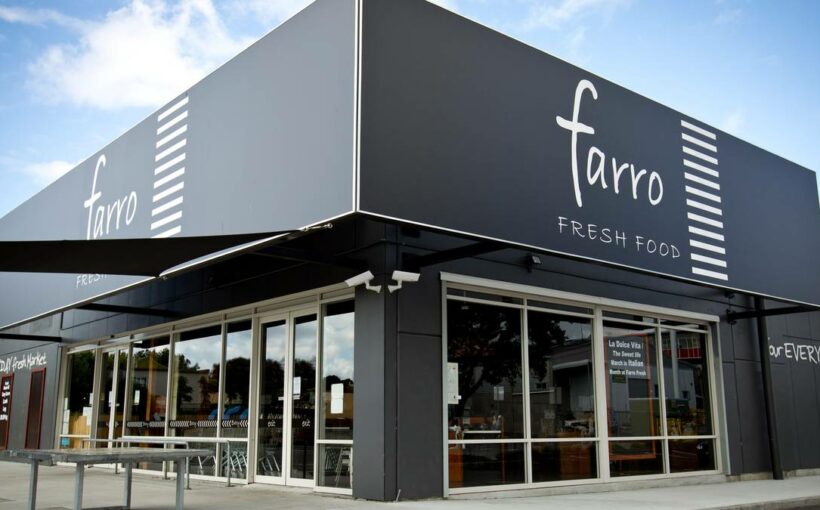Farro Fresh plans to open three new stores and to exceed $100 million revenue for the first time this year.
Chief executive Bryce Howard detailed the chain’s financials and expansion plans from six to nine stores.
But Tauranga and Hamilton don’t yet feature on the boutique food business radar, Howard saying Auckland remains the sole focus for growth at this stage.
But never say never.
“We are targeting three areas of Auckland. Real estate is the hardest part, leasing the properties. We want to lease those properties and have three new Farro stores. We have the capacity to do at least one new store a year,” Howard said.
“We have strong growth in place and we’re growing the number of stores. Growth in revenue for 2020 was north of $100m with six stores and it will be more than $100m in 2021,” he said.
Howard would not say where the three new stores would be but the lower North Shore, east and west Auckland could well be targets.
“We’re looking at more highly concentrated areas,” he said of population density when asked if the Shore’s northern area was a target.
Howard said he could not be specific about areas because plans had not been finalised but he did say Farro leases its sites rather than owing the properties directly.
Just this month, investor Ben Cook announced he would develop a $40m new Countdown in New Zealand’s wealthiest suburb, Herne Bay.
Today, Countdown opened a new metro store in the Wynyard Quarter within a $70m Infratil building.
New Zealand’s highest-revenue supermarket, Pak’nSave Albany, is said to be being sold later this year although Foodstuffs would not comment on that.
Farro was founded in 2006 by James and Janene Draper who began at Lunn Ave, Mt Wellington.
The business says an initial staff of 12 had grown to more than 300 people in stores at Epsom, Grey Lynn, Mt Eden, Mt Wellington, the North Shore and Orakei.
Howard said revenue rises were particularly strong in specific high-growth categories.
“That’s our ready-to-cook and ready-to-eat lines, for example, lasagne and over the counter sales of sandwiches and salads. I call it takeaways. It’s as good as what mum makes,” he said.
Howard said the firm’s approach to property was exemplified by what happened to the ex-Nosh store on Dominion Rd where one boutique food operator shut and Farro moved in fast.
“We turned that around in six weeks. That was the time between when we signed the deal and when we opened,” he said, giving that as an example of how speedily the business could move once it found the right area, site, building fit for its purposes, interviewed and employed new staff,installed signage, fitouts, brought in merchandise and opened the doors.
In 2018, Farro bought The Grocer’s Market in Mount Eden from its receiver. TGM Trading went into liquidation after director Aaron Drever failed to make contractual payments to the Nosh Group receiver.
Asked about carparking spaces, Farro’s Howard said high numbers and big site areas were not necessary in more densely populated areas of the city.
“For example at Dominion Rd, there are only 20 car parks and half our customers walk to get their groceries so it’s a case of shopping more frequently. That’s certainly a trend,” he said.
“In fact, some customers come to a store every day. Customers say they have to go to Countdown but they love to come to Farro.”
Asked about Hamilton and Tauranga, Howard said property there was not being sought but he did not rule it out in the longer term.
“There are plenty of opportunity in both those cities for a Farro-style of store but we have still got more opportunity in Auckland and we want to complete the growth here before we go further,” he said.
A supermarket executive said Farro did not threaten Foodstuffs’ Pak’nSave or New World models or margins, nor did it challenge Countdown.
The operations were very different, he said.
“What is interesting is that the big players grow their turnover each year but overall market share in grocery is much smaller for those two compared to 15 years ago,” the executive said.
The big chains once dominated “but as migrant popups have increased the overall spend, we have had much more investment in different food offerings like the Chinese supermarkets and diversification from home-delivered meal kits.
“So that spend is soaking up the market increases that traditionally would go to the big operators,” he said.
Source: Read Full Article

/cloudfront-ap-southeast-2.images.arcpublishing.com/nzme/SFPMW3X4X4V2YQNAQLGDQSY24Y.jpg)